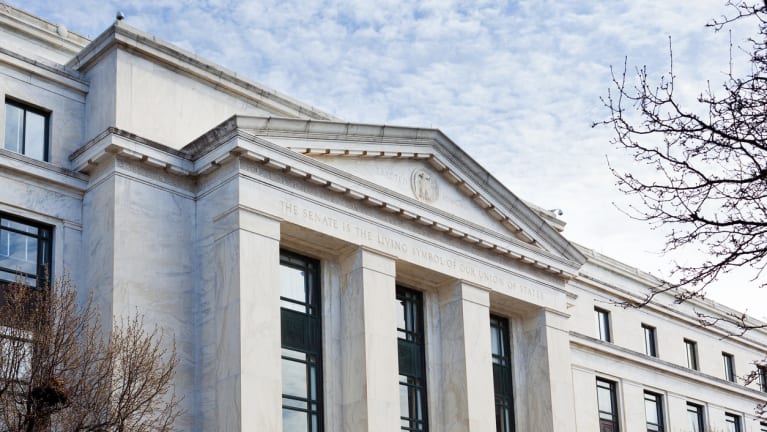

?A Senate committee hearing to discuss a labor reform bill showed disagreement between Republican and Democratic senators over the value that labor unions bring.
The Richard L. Trumka Protecting the Right to Organize (PRO) Act was reintroduced in Congress on Feb. 28. The bill would increase penalties for violations of workers’ rights, ensure that unions can collect fees, modernize the union election process and facilitate initial collective bargaining agreements. It would also make it more difficult for employers to classify employees as supervisors and independent contractors, who are not covered by the National Labor Relations Act, and would require greater transparency in labor-management relations.
In the past, SHRM has opposed previous versions of the PRO Act, stating it would create an imbalance
in labor relations.
Stricter Penalties for Violations
Liz Shuler, president of the AFL-CIO labor union in Washington, D.C., said the PRO Act is necessary because some companies fire union activists, hold mandatory anti-union meetings and spend huge sums on union-busting consultants. She believes companies see labor violations “as a cost of doing business. They bake it into their business model. The PRO Act would change that,” she told committee members.
In recent years, Starbucks and Amazon have faced allegations of taking illegal actions against union efforts.
“The very right to form a union is under attack,” Shuler said. “Workers face unpredictable schedules and understaffed and unsafe workplaces, and a lack of basic dignity on the job. Unions are the counterweight.”
Sen. Patty Murray, D-Wash., said the PRO Act would hold employers more accountable and help close the wage gap for women. “Unions have been helping to lift women,” she said.
Sen. Tammy Baldwin, D-Wis., said she was disturbed by a trend in companies moving factory jobs to nonunion sites or other countries. “We need to change these corporate calculations, and it begins with overseeing our federal employment and antitrust laws and our federal contracts. Unions provide the job security and the wages necessary for workers to develop the skills and the institutional knowledge that [are] the bedrock of innovation.”
Union Dues and Strikes
The PRO Act would override “right-to-work” laws in 27 states, which prohibit employers and unions from requiring workers to pay union dues whether they join the union or not. Supporters say these dues help unions improve working conditions for all employees, not just union members.
About 94 percent of private-sector workers are not union members, and many of them have no interest in joining a union, said Mark Mix, president of the National Right to Work Committee and president of the National Right to Work Legal Defense Foundation in Springfield, Va.
He argued that workers should have a right to not join a union and not pay union dues. “I think that’s good policy for America, and I think most American workers do as well,” he said.
Sen. Markwayne Mullin, R-Okla., asked “if you’re really for the employee, then why are you against ‘right-to-work’? If you’re really about the employee, let the employee make the choice. Don’t force somebody to pay dues to an organization they may not agree with.”
Sen. Bill Cassidy, R-La., said workers might feel “a union limits their workplace flexibility, eliminates their ability to be rewarded. Maybe they don’t want a certain amount of their paycheck going to pay union leaders’ salaries. And maybe they don’t want a certain amount to disproportionally go to political candidates for whom they do not vote.”
The PRO Act also would strengthen strike protections, permitting intermittent strikes and secondary strikes, which target the customers of the employer. Currently, those moves are not legally protected activity.
Cassidy claimed intermittent and secondary strikes “would be a highly effective tool to bring a company to its knees.”
Franchise Relationships and Independent Contractors
Sen. Roger Marshall, R-Kan., asked whether the PRO Act might hurt franchisees and franchisors, since it potentially broadens the definition of joint employers. “I’m concerned when the federal government gets too involved. If it’s not broke, don’t fix it,” he said.
John Ring, an attorney with Morgan Lewis in Washington, D.C., and former chairman of the National Labor Relations Board (NLRB), said the PRO Act “would do more harm, as far as I’m concerned” because it would remove impediments to a joint-employer relationship.
Sen. Tina Smith, D-Minn., expressed concerns about employers misclassifying their workers as independent contractors in order to avoid labor costs and liability.
Mix said the PRO Act would put independent contractors under a more stringent set of guidelines, and some of them might have to pay union dues if they are reclassified as employees.
However, Shuler said the PRO Act “wouldn’t discourage independent contractors who are truly independent. What we’re trying to get at is employers that are misclassifying their workers.”
Instead of passing the PRO Act, Ring urged Congress to consider other modifications, like speeding up the process for the NLRB to decide cases, preventing the swing-in policy and precedent at the NLRB when new administrations come in, and keeping the NLRB focused on collective bargaining issues.

